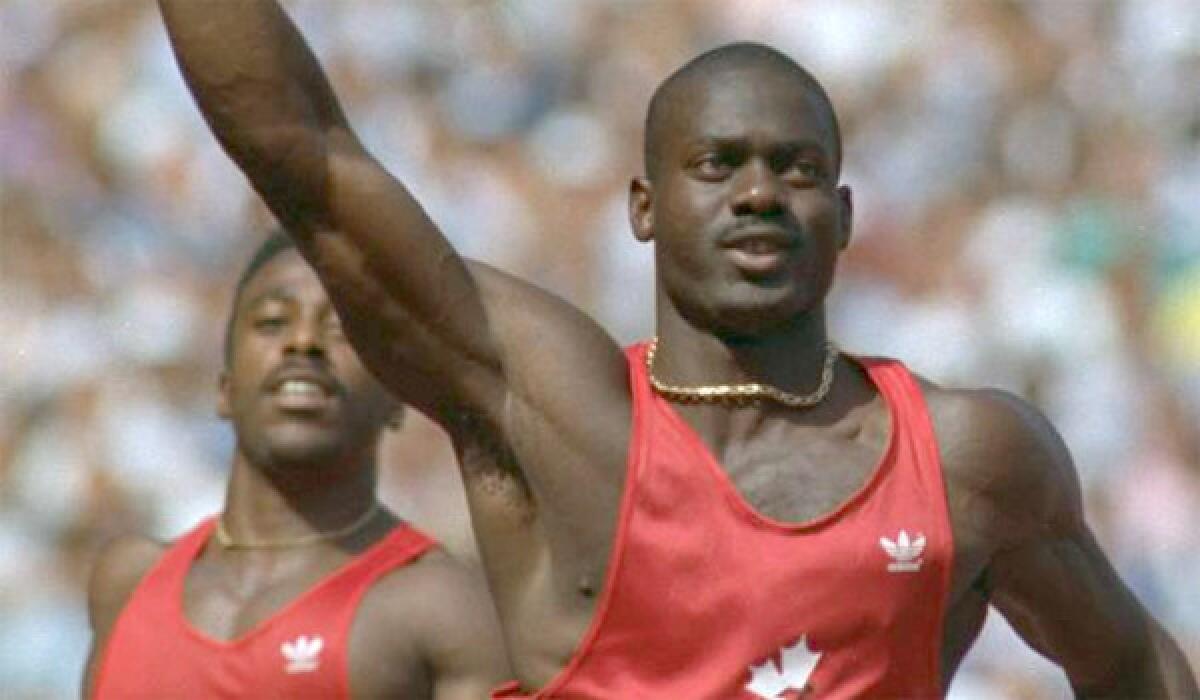Ben Johnson, stripped of 1988 gold medal, joins fight against doping

- Share via
Having Ben Johnson become involved in an anti-doping initiative seems like the equivalent of inviting a thief to play a key role in advising police on how to stop crime.
But to Johnson, the Canadian sprinter who won a gold medal in the 100 meters at the 1988 Seoul Olympics but was stripped of his victory after he tested positive for a banned steroid, it makes sense for him to combat the cheating and drug use that continues to occur in track and field.
Johnson is headlining an anti-doping initiative promoted by Skins, a Switzerland-headquartered sportswear company that specializes in compression clothing for athletes and espouses clean and fair play in all sports. He has acknowledged his own cheating was wrong, and he is taking a lead role in the Pure Sport initiative put forward by Skins.
“In my early years I thought that watching track and field and watching sports that everything else was clean,” Johnson said, “but when I got involved more, later on in my career, I found it was widespread and a lot of athletes were doing what I was doing back in 1988.”
Johnson is making an international tour to promote his new cause. The tour is scheduled to end in Seoul, South Korea on Sept. 24, the 25th anniversary of Johnson’s tainted triumph in 9.79 seconds.
“We hope we have athletes who test positive and might want to come and help us clean this up,” he said. “And the more athletes we have, the more power we have to generate more interest of trying to get rid of doping in sports.”
Jaimie Fuller, chairman of Skins, said a foundation of the company’s proposal lies in giving more funding and autonomy in doping matters to the World Anti-Doping Agency.
“We see WADA as the custodian of anti-doping in the world,” Fuller said. “And if WADA can’t be given the resources to do their job, it’s certainly not going to happen if it’s left to the governments alone who drive the anti-doping organizations or the international federations.”
Fuller said educating athletes about the perils of doping is crucial, and that the Pure Sport initiative would include an athletes’ council that would promote whistle-blowing and an exchange of information between athletes and anti-doping officials. Testing alone is not enough.
“It’s about changing culture and it’s about education,” he said. “Creating and using that intelligence to keep up with the dopers is vital. “If you’re serious about this fight, you’ve got to get deeper.”
ALSO:
This fall could mean a rise in L.A. sports excitement
Bryan twins’ run at a Grand Slam ends with loss at U.S. Open
Landon Donovan rediscovered his love of soccer when he left it
More to Read
Go beyond the scoreboard
Get the latest on L.A.'s teams in the daily Sports Report newsletter.
You may occasionally receive promotional content from the Los Angeles Times.











